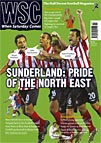 Dear WSC
Dear WSC
Bruce Wilkinson (WSC 267) pointed out that ticket queues “seem a quaint ritual of a bygone age”. Waiting in a virtual internet queue bears no similarity to lining up outside the box office. I have my tickets for the FA Cup final, but I do not feel as if I earned them. Instead of getting up in the middle of the night, crossing London, losing half a day’s work, standing in the rain shuffling forward inch by inch while nervous that there are too many punters and too few tickets, I merely sat in my dressing-gown in front the PC. There is no one to talk to in the “virtual waiting room”. Your opportunity is allotted randomly. Suddenly it’s all over and you have what you came for. One should be happier as the process is simple and efficient and the desired result achieved, but somehow it feels like a hollow victory as it lacks the sense of accomplishment joy and triumph of the old-fashioned process. You can’t even wave the tickets in triumph above your head as they are sent by post.Obviously my complaining about the changes that actually improve my life marks me down as “old”. I am not asking to bring back rickets and polio and to repeal the Factory Acts but I do miss a modicum of discomfort and inconvenience. The old experience was akin to standing on the terraces or being subject to the over-zealous policing that used to mark us out as a tribe. Under the new regime the tickets are yours if your broadband speed is faster and your credit card more golden than the next, rather than if you have more commitment stamina and perseverance.Will the ultimate progress be when we treat football like theatre and opera by dressing-up smartly for the occasion and ordering our interval drinks? Or is that Club Wembley?
Patrick Sheehy, London
Search: 'media'
Stories
 Simon Cotterill examines the legacy of half-filled stadiums from the 2002 World Cup
Simon Cotterill examines the legacy of half-filled stadiums from the 2002 World Cup
There was dismay in Japan and South Korea when FIFA announced in 1996 that the 2002 World Cup would be shared between them. The countries’ relationship was frosty at best and the bidding war between them had been fierce, bitter and expensive. Although shocked at FIFA’s unprecedented decision, both were at least relieved that they hadn’t actually lost the vote, and so set about trying to out-do each other by pumping billions into football facilities.
 Five years ago the Football League became Leagues One and Two and the Championship. Roger Titford assesses the transition
Five years ago the Football League became Leagues One and Two and the Championship. Roger Titford assesses the transition
Lord Mawhinney of the Football League is pleased to announce attendances in the competition have risen to their highest level since the early 1960s. The particular star of the show is the Championship where crowds are up five per cent on last season and back to a level last seen in the reign of George VI (apart from a statistical blip in 2006-07).
 Wembley may not be full but for fans of two former League clubs the Blue Square play-off final represents more than just a day out. And for the players, there’s the chance to meet Martin O’Neill. Taylor Parkes was there
Wembley may not be full but for fans of two former League clubs the Blue Square play-off final represents more than just a day out. And for the players, there’s the chance to meet Martin O’Neill. Taylor Parkes was there
One of the innumerable problems with the concentration of power in 21st century football is the banalisation of the big event. Like boy pharaohs fed powdered gold, fans of the chosen few grow blase and faintly nauseous (“not Barcelona again!”), while the rest exist in a world of shadows and reflections, where up and down begin to lose their meaning. Days like this can restore your faith. Neither Cambridge nor Torquay are strangers to League football, so re-entry is an itch that must be scratched, more than an adventure – but for everyone involved, this is a very big deal. Wembley Park station is heaving, not just with shaven-headed forty-somethings but kids and old ladies, girlfriends and boyfriends, well-wishers and day-trippers (and a child in a Chelsea shirt who doesn’t quite get it). Grey skies and high winds don’t so much dampen the festive mood as accentuate the drama, as we weave through police horse dung down old Olympic Way, towards what will, for men of a certain age, always be “the new” Wembley Stadium.
 Owen Amos reports on how the FA Vase provides an opportunity for smaller clubs to have their moment in the Wembley sun
Owen Amos reports on how the FA Vase provides an opportunity for smaller clubs to have their moment in the Wembley sun
To understand to whom the FA Vase matters, look at the list of winners. Since 1974-75, the Vase’s first season, 20 of the winners have been suffixed “Town”: from Brigg and Bridlington, to Whitby and Wimborne. By contrast, just two winners – Truro and Winchester – have been Cities.